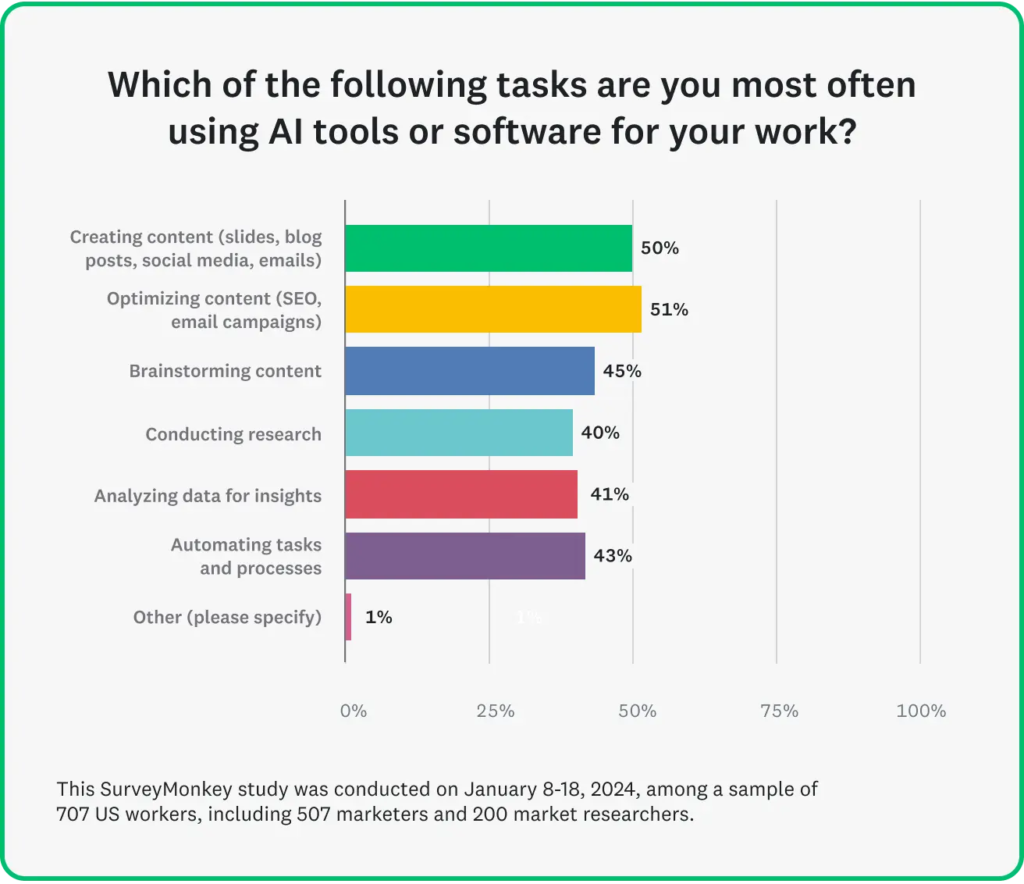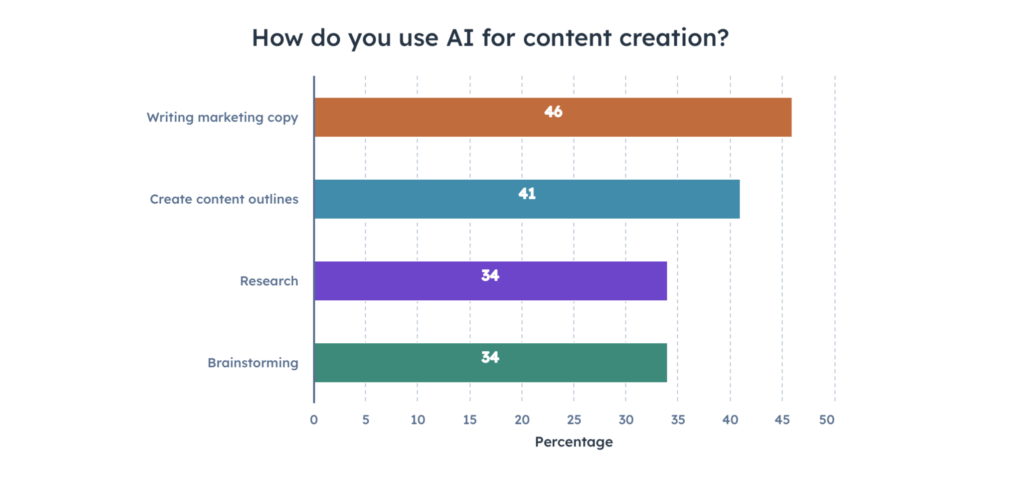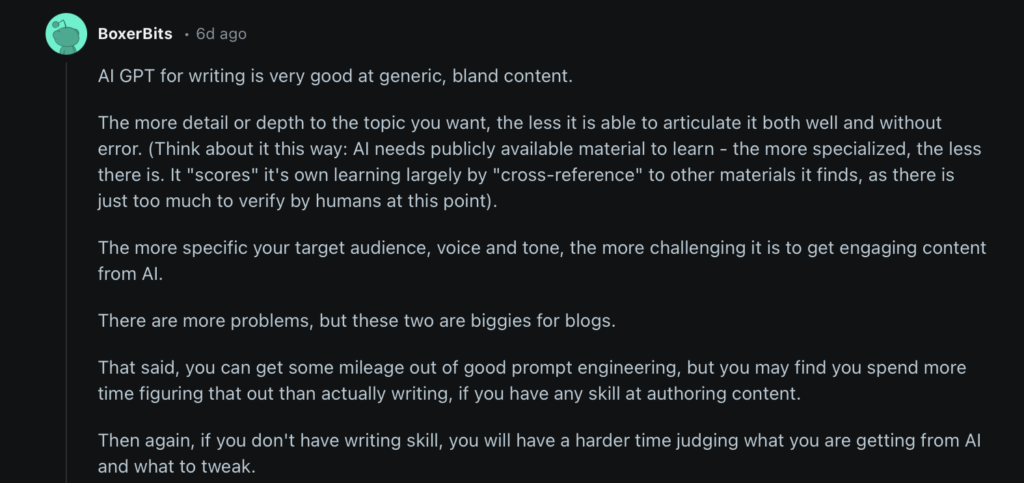“The future of SEO is AI-driven,” said no struggling content creator ever.
You’ve heard it all—AI is here to take over the content industry, right? Wrong. Sure, AI can whip up content faster than you can brew your morning coffee. But can it really craft blog posts that attract readers and rank on Google’s first page?
Before you decide to let an AI write SEO blog post, consider this: A study by Salesforce found that while 60% of marketers say generative AI will transform their jobs, many still are concerned about the accuracy of the output. It’s like using a GPS to navigate. It gets you closer to your destination, but you still need to steer.

So, what’s the answer? Can AI truly handle the art and science of SEO writing, or does it need a human touch to stand out? Well, let’s dig into this topic and separate fact from fiction.
The Current Role of AI in SEO Content Creation
AI writing tools are the new multitasking assistants. They handle content creation, optimization, and even keyword research—all in a fraction of the time it would take a human. But here’s the kicker: can AI write SEO blogs that are truly engaging, informative, and competitive? Well, that depends on how you use it.
Many marketers already rely on AI for foundational tasks like creating outlines, suggesting SEO keywords, and even generating meta descriptions. In fact, 51% of marketers claim that AI has improved their content marketing strategies, particularly for search engine optimization (SEO).

But let’s not get carried away. AI may excel at automating repetitive tasks, but it still struggles to replicate human creativity.
Take this example: Some content writers use AI to generate blog structures and draft content. Then, they step in to refine it—adding stories, examples, and emotional hooks that make the content truly resonate. It’s a collaboration, not a takeover. In simpler terms, AI can write SEO blogs, but it’s still your job to add the flavor.
So, where does AI really shine? Tasks like keyword placement, topic clustering, and content analysis are its bread and butter. Just think of it as your digital assistant that helps lay the groundwork while you focus on creative storytelling and strategic insights. In fact, 71% of marketers say generative AI will allow them to focus on more strategic work.
Advantages of Using AI for SEO Blog Posts
Of course, AI has certain advantages for content creation and many use AI to write blog posts. Here are the main two reasons why they do it:
AI Help Overcome Empty Page Syndrome
Let’s face it—staring at a blank page can feel like you’re in an epic battle with writer’s block. But here’s where AI comes in like a knight in shining algorithms.
AI can write SEO blogs faster than you can brainstorm a catchy headline, helping you move past that “empty page syndrome.”

It’s like having a co-writer who drafts outlines, sprinkles in keywords, and even suggests relevant subheadings—all in a matter of seconds. Imagine the hours you’d save!
It Automate Mundane Tasks
Another key advantage? AI doesn’t get tired of repetitive tasks. It can automate readability score improvement, keyword integration, monitor SEO trends, and analyze performance metrics faster than a caffeine-fueled SEO analyst. This automation can be a game-changer, particularly for high-volume content strategies.
Need a solid example? Some writers use AI to draft first versions of their blog posts, then layer in human insights. This blend of machine efficiency and human creativity often results in content that ranks well and resonates with readers.
“Generative AI has the potential to change the world in ways that we can’t even imagine.“
Bill Gates
As Bill Gates once put it, “Generative AI has the potential to change the world in ways that we can’t even imagine.” That includes how businesses optimize their digital presence through SEO content. So yes, AI can write SEO blogs that save time, but the key to success is how you combine AI’s efficiency with your unique voice.
Limitations and Challenges of AI-Generated Blog Posts
So, AI can write SEO blogs, but can it craft something that truly hooks your audience? Here’s the not-so-shiny side of AI content: it can be accurate one moment and wildly off the mark the next. Think of AI like a brilliant but scatterbrained assistant—it might sound convincing but could occasionally make things up out of thin air.
1. Inaccurate or Fabricated Information
AI sometimes generates false information, often referred to as “hallucinations.” For instance, an Australian lawyer cited non-existent court cases in a legal filing after relying on AI without fact-checking. If you don’t verify AI-generated content, you risk publishing errors that can harm your credibility.
2. Lack of Originality in Niche Topics
AI relies on patterns found in publicly available content, which can be problematic for highly specialized or niche topics. If your subject matter isn’t well-documented online, AI may produce vague, surface-level content that doesn’t offer real value to your audience.
In niche industries, this lack of specialized knowledge can hurt SEO performance and reader engagement. As one Reddit user put it, “AI needs publicly available material to learn. The more specialized the topic, the less helpful AI becomes.”

3. Generic and Emotionless Tone
AI’s writing style is often too neutral and generic. Sure, AI can write SEO blogs, but if you’re targeting a highly specific audience, AI’s cookie-cutter style may not cut it. For SEO success, especially in competitive markets, content needs to engage readers on an emotional level. Without human intervention, AI may miss the mark on tone, humor, or relatability.
Quick Tip: If you have GPT 4 subscription, you can create a custom GPT for content writing. This will adapt to your writing style and language.
4. Ethical and Authenticity Concerns
There’s a growing emphasis on transparency in content creation. The U.S. Authors Guild, for example, recently introduced a “Human Authored” certification to distinguish human-created content from AI-generated work. For brands focused on trust and credibility, it’s essential to maintain authenticity by blending AI efficiency with human oversight.
How to Leverage AI to Enhance SEO Content
Here’s the truth: AI can write SEO blogs, but only if you know how to use it as a powerful tool rather than a complete solution. Think of AI as your digital assistant—it can handle the groundwork, but the final masterpiece needs your creative touch.
1. Start with an AI Draft, Then Add Your Insights
As said earlier, using AI to generate the first draft is a great way to overcome the dreaded blank page. Let AI handle the initial structure and keyword placement, but remember to personalize the content. Add stories, examples, and your unique insights to create a post that feels authentically human.
2. Use AI for Keyword Integration and Optimization
AI excels at analyzing SEO trends and integrating keywords seamlessly. You can prompt AI to craft headings and paragraphs that include target keywords naturally. This saves time and ensures your content aligns with SEO best practices. However, always double-check keyword density to avoid overstuffing, which can hurt your ranking.
3. Always Fact-Check AI Output
AI-generated content can sometimes be inaccurate or misleading. Before publishing, verify any facts, statistics, or references provided by AI.
"AI is good at describing the world as it is today, but it doesn’t know how the world should be."
4. Refine Tone and Readability
AI writing can sometimes feel robotic. Adjusting the tone to match your brand’s personality is crucial for reader engagement. For example, if your audience prefers a conversational style, rewrite AI-generated sentences to feel more natural and relatable.
5. Break Down Long-Form Content
Creating long-form content? Don’t overwhelm yourself by generating everything in one go. Instead, tackle it section by section. Use AI to draft each part, then review and edit before moving on. This method helps maintain consistency and ensures high-quality output throughout the blog post.
By following these steps, you’ll get the best of both worlds: AI’s efficiency and your creativity.
SEO and AI-Generated Content: What the Experts Say
AI tools are becoming key players in content marketing, but what do industry experts and studies say about the effectiveness of AI-written SEO content? Can AI write SEO blogs that perform well in search rankings without human intervention? The short answer: yes—but with caveats.
AI Content Can Rank with Optimization
According to research, AI-generated content optimized by humans has an almost 80% success rate for landing on the first page of search results, compared to just 22% for human-only content. This emphasizes AI’s potential as a time-saving tool for marketers, especially in scaling content output.
However, as reported by Emory Business, AI content risks losing engagement without personalization, since it tends to prioritize data-driven optimization over emotional connection. Therefore, while AI can accelerate productivity, human creativity remains essential to maintain relevance and authenticity.
AI Needs Prompt Engineering for Best Results
Experts agree that crafting effective prompts is key to maximizing AI’s capabilities. Insights from Reddit discussions emphasized that AI can be a strong tool for overcoming writer’s block, generating outlines, and filling in structural gaps. However, contributors also noted that AI struggles with niche or highly technical topics due to limited data availability.
Many users shared that successful AI implementation requires both prompt engineering and content customization—including human edits to refine tone, verify facts, and reorganize content for clarity. Without clear guidance and active oversight, AI risks generating redundant or low-value material that fails to meet SEO goals.
If you’re new to prompt engineering, you must this quick guide I’ve written for content writers: Prompt Engineering in Content Writing? 4 Tips for Excellence
AI + Human: Collaboration is the Future
Content marketers emphasize that the best results come from a collaboration between AI and humans. AI can handle the heavy lifting—generating drafts, automating keyword placement, and analyzing SEO data—while humans shape the content to resonate with readers.
In conclusion, AI can write SEO blogs, but long-term success hinges on how well you optimize and enhance its output. As AI technology evolves, staying informed and adaptable will help content creators harness its full potential.
Read Next: Can AI Replace Human Writers?

I’m a marketer turned into a content writer. I go the unconventional paths of content writing to explore the horizon of possibilities and novel approaches to help brands communicate.
If you’ve loved reading this blog, hit me a ‘Hi’ on LinkedIn.
